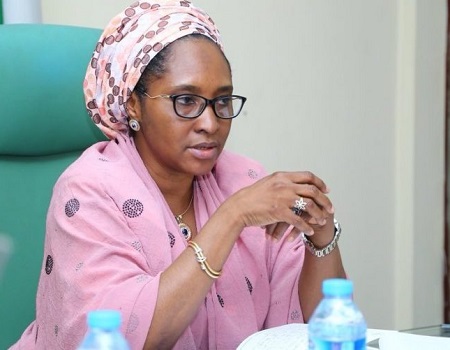Minister of Finance, Budget and National Planning, Mrs Zainab Ahmed, has issued the 2022 federal government budget circular indicating its intention to spend a total of N13.98 trillion to finance its activities in 2022 according to a budget call circular it has published.
In the circular, Ahmed warned ministries, departments, agencies and commissions to ensure that in preparing their 2022 estimates, they must ensure strict adherence to priorities and core objectives of the administration.
These include establishing a strong foundation for a diversified economy; investing in critical physical, financial, digital, and innovation infrastructure; building a solid framework and enhancing capacities to strengthen security and ensure good governance; enabling a vibrant, educated, and healthy populace; prominence should also be accorded to human capital development, specifically Health, Education and Social Inclusion in resource allocation.
With projected revenue of N8.76 trillion, the proposal has an inherent deficit of N5.22 trillion; crude oil price benchmark of $57/barrel; oil production of 1.88 million barrels/day; and exchange rate of N410/$.
“This aggregate expenditure is made up of Statutory Transfers of N613.36 billion, Debt Service of N3.61 trillion, Sinking Fund of N292.71 billion, and Recurrent (non-debt) expenditure of N6.21 trillion, A total of N4.79 trillion (inclusive of N750.04 billion for GOEs) is provided for personnel and pension costs, an increase of N534.40 billion over 2021. This is 57per cent of projected aggregate revenues for 2022.”
The N1.76 trillion available for MDAs’ capital is N259.32 billion (representing 12.8 per cent) less than the provision for MDAs in the 2021 Appropriation Act.
Ahmed who lamented the continual provision of fuel and electricity subsidies as they remained a major drainer to overall government revenues disclosed that N613.36 billion Statutory Transfers will be allocated to the National Judicial Council (NJC), Universal Basic Education Commission (UBEC), Niger Delta Development Commission (NDDC), National Assembly (NASS), Independent National Electoral Commission (INEC), National Human Rights Commission (NHRC), Public Complaints Commission (PCC), North East Development Commission (NEDC) and Basic Health Care Provision Fund (BHCPF).
The aggregate sum of N3.261 trillion (excluding the capital component of statutory transfers) has been set aside for critical capital expenditure, N1.759 trillion provided for MDAs’ capital expenditure; N366.14 billion for Capital Supplementation; N62.24 billion for Grants and donor-funded projects; N10 billion for Social Investment Programme; N425.02 billion for GOEs; and N638.32 billion for Multi-lateral and Bi-lateral Project-tied loans.
According to her, no new capital project would be accommodated in the 2022 budget as “the thrust of the federal government’s capital expenditure programme in 2022 will be the completion of as many ongoing projects as possible.”
She also admonished MDAs to be acquainted with the approved price list in preparing the budget estimates as published on the portal of the Bureau for Public Procurement (BPP).
“MDAs are also enjoined to desist from the practice of specifying the models/brands of assets they propose to acquire in the budget.
“As much as possible, generic specification of items should be made in accordance with the Public Procurement Act.”
The Minister also declared that MDAs not yet on IPPIS will not be provided for in the personnel budget for 2022.
YOU SHOULD NOT MISS THESE HEADLINES FROM NIGERIAN TRIBUNE
FG issues N13.98 budget circular for 2022
We Have Not Had Water Supply In Months ― Abeokuta Residents
In spite of the huge investment in the water sector by the government and international organisations, water scarcity has grown to become a perennial nightmare for residents of Abeokuta, the Ogun State capital. This report x-rays the lives and experiences of residents in getting clean, potable and affordable water amidst the surge of COVID-19 cases in the state. FG issues N13.98 budget circular for 2022






